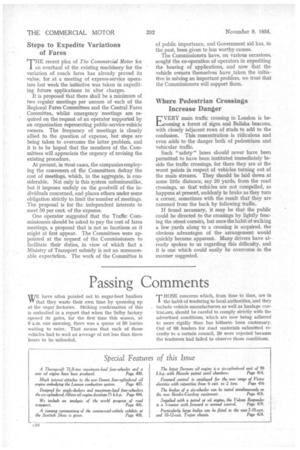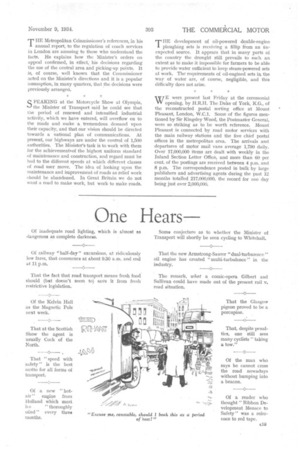Special Features of this Issue
Page 48

Page 49

If you've noticed an error in this article please click here to report it so we can fix it.
A Thornycroft 74-8-ton maximum-load four-wheeler and a
new oil erigine have been produced. Page 400.
Much interest attaches to the new Dennis four-cylindered oil
engine embodying the Lanova combustion system. Page 403.
Designed for single-deckers and maximum-load four-wheelers the six-cylindered Albion oil engine develops 75 b.h.p. Page 404.
We include an analysis of the world progress of road transport. Page 406.
A running commentary of the commercial-vehicle exhibits at
the Scottish Show is given. Page 408, The latest Dorman oil engine is a six-cylindered unit of 90 b.h.p. with Ricardo patent swirl chambers. Page 414.
Forward . control is employed for the new range of Victor
electrics with capacities from 6 cwt. to 2 tons. Page 416 The brakes of a six-wheeler can be tested simultaneously on the new Bendix-Cowdrey equipment. Page 418.
Supplied with a petrol or oil engine, the Vulcan Responder
is a 5-toriner with forward or normal control. Page 419.
Particularly large bodies can be fitted to the new 7-10-cwt. and 10-12-cwt. Trojan chassis. Page 424.
rr HE Metropolitan Commissioner's references, in his
annual report, to the regulation of coach services in London are amusing to those who understand the facts. He explains how the Minister's orders on appeal confirmed, in effect'. his decisions regarding the use of the central area and picking-up points. It is, of course, well known that the Commissioner acted on the Minister's directions and it is a popular assumption, in many quarters, that the decisions were previously arranged.
SPEAKING at the Motorcycle Show at Olympia, the Minister of Transport said he could see that the period of renewed and intensified industrial activity, which we have entered, will overflow on to the roads and make a. tremendous demand upon their capacity, and that our vision should be directed towards a national plan of communications. At present, our highways are under the control of 1,500 authorities. The Minister's task is to work with them for the achievementimf the highest uniform standard of maintenance and construction, and regard must be had to the different speeds at which different classes of road user move. The idea of looking upon the maintenance and improvement of roads as relief work i,hould be abandoned. In Great Britain we do not want a road to make work, but work to make roads.
IT HE development of oil-powered double-engine ploughing sets is receiving a fillip from an 'unexpected source. It appears that in many parts of the country the drought still prevails to such an extent as to make it impossible for farmers to be able to provide water sufficient to keep steam-powered sets at work. The' requirements of oil-engined sets in, the way of water are, of course, negligible, and this difficulty does not arise.
W E were present last Friday at the ceremonial • opening, by H.R.H. The Duke of York, K.G., of the reconstructed postal sorting office at Mount Pleasant, London, W.C.1. Some of the figures mentioned by Sir Kingsley Wood, the Postmaster General, were so striking as to be worth reference. Mount Pleasant is connected by road motor services with the main railway stations and the five chief postal offices in the metropolitan area. The arrivals and departures of motor mail vans average 1,790 daily. Over 17,000,000 items are dealt with weekly in the Inland Section Letter Office, and more than 60 per cent, of the postings are received between 4 p.m. and 8 p.m. The correspondence posted in bulk by large publishers and advertising agents during the past 12 months totalled 217,000,000, the record for one day being just over 2,000,000.
























































































































